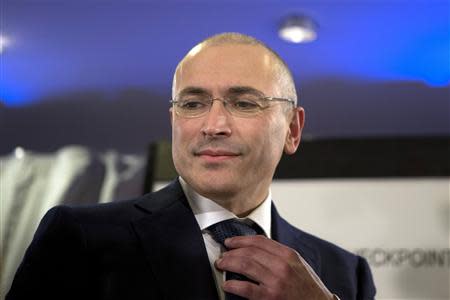Russian supreme court to review Khodorkovsky convictions

MOSCOW (Reuters) - Russia's Supreme Court on Wednesday said it will review two convictions against former oil tycoon Mikhail Khodorkovsky, including a ruling the Kremlin critic said was preventing him from returning to Russia despite a presidential pardon. After more than a decade in jail when Khodorkovsky was widely seen as a political prisoner of Vladimir Putin, he was unexpectedly pardoned and set free on Friday and has been staying in Berlin since. The pardon came as Russian authorities had begun to investigate a third criminal involving him that could have extended his jail sentence past August. The Kremlin has given assurances that he is free to return to Russia, but Khodorkovsky has said there is no guarantee he would be able to leave again if he did. He said he would not return home as long as a court order that he pay 17 billion roubles ($521 million) in tax arrears remains in place. A spokesman for Russia's highest court said a review of the convictions in 2005 and 2010 over his management of defunct oil major Yukos will take place in the next two months based on the recommendation of the European Court of Human Rights. The Strasbourg-based court ruled in July that Russia's first case against Khodorkovsky - once Russia's richest man - was legitimate but found that the trial was unfair and his sentencing to a remote jail near the Arctic Circle unjustified. Khodorkovsky told Russian daily Kommersant he welcomed the review and hoped it would help his jailed former business partner Platon Lebedev to be released before his sentence is due to end in May. Khodorkovsky's lawyer, Vadim Klyuvgant, told Reuters Wednesday's decision may remove an impediment to his client's "free movement and of a financial character". Khodorkovsky, 50, was arrested after he fell out with the Kremlin as Putin, then in his first term, reined in influential "oligarchs" who had made fortunes snapping up assets during the chaotic years after the collapse of Soviet communism. He was convicted of grave financial crimes in two trials that Kremlin critics say were part of a political campaign to punish him for challenging Putin, to bring his oil assets under state control and to warn other tycoons to toe the line. (Reporting by Maria Tsvetkova; Writing by Alissa de Carbonnel)

